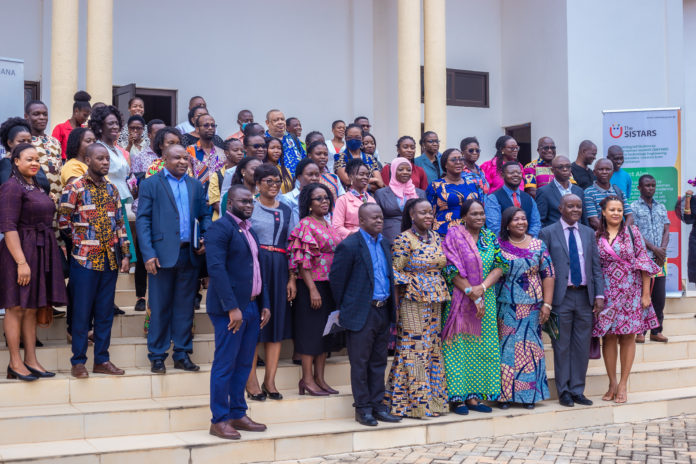
The Vice-Chancellor of the University of Ghana, Professor Nana Aba Appiah Amfo, has launched a project to advance women in Science Technology Engineering and Mathematics (STEM).
The project is titled TranSforming InSTitutions to Advance women leadeRS in Science Technology Engineering and Mathematics (STEM): Lessons from Ghana and Kenya (SISTARS).
It was launched on August 5, 2022, and chaired by Prof. Boateng Onwona-Agyeman, Provost, College of Basic and Applied Science.
In her address, Prof Amfo highlighted the importance of STEM education to nations’ growth and development.
She noted that over the past five years (2018 to mid-2022), the physical and mathematical sciences suffered a decline in the proportion of females as compared to engineering.
She intimated the SISTARS project has come at the right time to complement the University’s fourth pillar in its Strategic Plan and understanding and scientifically documenting the challenges women face in STEM would eventually influence national and institutional policies.
The Acting Minister for Gender, Children and Social Protection, through a speech, read on her behalf by the Deputy Director of the Ministry, Madam Linda Coffie, expressed support for the project.
She stated that the ministry is of the firm belief that the overall goal and objectives of the project would be actualised to enhance women’s participation in STEM and overall gender mainstreaming across all sectors.
The project Principal Investigator, Dr Dzidzo Yirenya-Tawiah, revealed that there is an under-representation of women in STEM and leadership positions in Africa.
“A 2021UNESCO Science Report indicated that in Africa only 30% of science professionals are women.
“In Ghana, out of the best ranked 3,000 best scientists, only 285, representing 9.5% are females,” she cited.
She stated that sustainable development and economic growth cannot be achieved unless women are empowered to contribute their quota to development.
Dr Katie Bryant of the IDRC and Prof Faith Karanja University of Nairobi joined the meeting virtually. Dr Bryant noted that the University of Ghana has many women in high-level management and governance positions.
She pointed out that the IDRC has an ongoing established long working history with the University of Ghana and various partners in Kenya.
Currently, IDRC is directly supporting five projects at the University of Ghana and many others, indirectly.
She encouraged the project to develop, implement, and study innovative interventions that can retain and advance women’s leaders in STEM careers while calling on policymakers and organizations to develop policy frameworks that promote women in STEM leadership.
On her part, Prof. Faith Karanja indicated that women and girls have the undeniable right to study science, work in science and most importantly, lead in science.
Her expectation is that the partnership with the University of Ghana team will ensure better research outcomes.
The Director of IESS, Prof. Kwasi Appeaning Addo, noted that IESS has been working very hard over the years to achieve its mission by undertaking cutting-edge research such as the SISTARS project to inform policy.
He stated that IESS has trained several women in environmental science who are playing leadership roles in both academia and industry.
He also emphasised the need to do more for equitable representation in leadership and decision-making positions, in STEM-related industries and institutions.
In his closing remarks, the Chairman, Prof Boateng Onwona-Agyeman, Provost, was hopeful the project would bring an end to some of the challenges women in STEM face in their daily work.
He also was hopeful that the project would discover some emerging challenges and solutions that male counterparts in Science Technology Engineering and Mathematics face.
The project is led by the Institute for Environment and Sanitation Studies (IESS) with support from, the Department of Geography and Resource Development, the Institute of Statistical, Social and Economic Research (ISSER), as well as the School of Engineering, all from the University of Ghana (UG).
Project partners in Kenya include the University of Nairobi, Africa Population and Health Research Centre, and Women in Water and Sanitation.
It is a three-year project funded by the International Development Research Centre of Canada.
The purpose of the project is to address systemic institutional issues pertaining to gender and leadership disparities in STEM through a cross-country landscape analysis of women in STEM in academia and industry.






